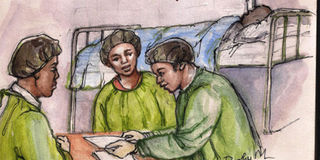Death by your doctor’s error

The number of doctors charged with medical manslaughter has increased over the years. Medical manslaughter cases fall in the area of involuntary manslaughter. Involuntary manslaughter is of two forms; unlawful act manslaughter and gross negligence manslaughter.
A doctor, like any other person, may occasionally err in his or her practice. This error may be so disastrous, leading to the death of the patient. But for most cases this error is unintentional.
However, doctors have been prosecuted and held criminally liable and even imprisoned for such errors, especially if the error is considered gross negligence. The challenge often in law is what constitutes gross negligence.
Negligence
The ingredients of the offence of medical manslaughter have been derived from a case involving an anesthetist.
An anesthetist is a specialist doctor who, among other duties, administers the drugs that make a patient “sleep” and not feel pain during an operation and also monitors the patient during the operation.
During one such operation, an anesthetist failed to notice for six minutes during an operation that the oxygen supply to the patient had become disconnected from the ventilator.
As a result, the patient suffered a cardiac arrest and died. The doctor did not react to the subsequent cessation of movements of breathing in this paralysed patient or to the cessation of the ventilator’s indicator’s of oxygen delivery. The doctor was charged with the offence of manslaughter by gross negligence.
In the course of the trial, the elements of the offence were specified as follows, which the prosecution had to prove beyond reasonable doubt.
a)That the doctor owed the patient a duty of care
b)The doctor breached that duty
c)The breach caused or significantly contributed to the patient’s death
d)The breach was grossly negligent
In determining gross negligence, court considered the extent to which the doctor’s conduct departed from the proper standard of care.
The crucial issue was whether having regard to the risk of death involved the conduct of the doctor was so bad in all circumstances to amount to a criminal act of omission.
In medical practice there are different types of errors. These include mistakes, slips, technical errors and violations.
Mistakes are errors in planning an intervention while slips are failures in execution of an action often because of a momentary loss of concentration. Technical errors are errors of judgment while violations are deliberate deviations from safe practice.
Violations often have no defence and generally constitute gross negligence. However, some doctors have been found guilty or pleaded guilty in cases of slips or mistakes.
Gross negligence
Gross negligence means that there has to be a breach of the duty of care so serious as to constitute a crime.
The conduct of the doctor must have fallen far below that of a reasonable practitioner.
The degree of seriousness is the departure from the proper standard of care and also taking into consideration the circumstances the doctor was placed in when the death occurred.
The circumstances are important in determining whether somebody has committed a crime.
Doctors have resorted to defensive medicine in a bid to circumvent criminal prosecution for medical manslaughter.
Defensive medicine is of two forms, the so-called positive defensive medicine or negative defensive medicine. In positive defensive medicine, patients are provided with services of no medical value but with the objective of persuading the legal system that the standard of care was met.
Alternatively, doctors may attempt to distance themselves from sources of legal risk and these may include forgoing invasive procedure or avoiding high risk patients.
One professor has this advice to doctors: “I think doctors have to ensure that they write everything down that relates to a consultation, such as management plans etc. It’s no use relying on verbal instructions, so you have to be very clear and the handwriting has to be legible.”



